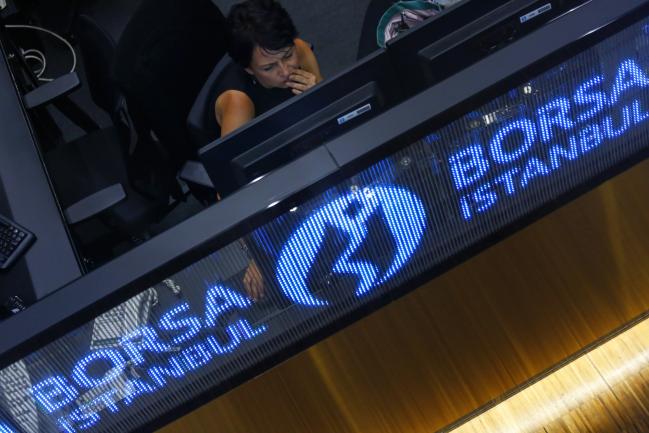(Bloomberg) -- Desperate measures are in the air in Turkey: trading rooms are awash with talk of a bailout by the International Monetary Fund and potential capital controls. But there’s a vacuum at the core.
The central bank and government have been largely silent as the currency plummeted to record lows and the U.S. imposed sanctions and threatened more. The lira slipped for a seventh day against the dollar after falling by the most in a decade on Monday, while the yield on 10-year bonds surged above 20 percent to an all-time high.
“It will remain like this until the central bank commits unconditionally to hike rates and keep them high until inflation has turned,” Henrik Gullberg, a strategist at Nomura International Plc, said by email. “The market needs that sort of hard commitment.”
Yet the radio silence from Ankara -- a result of June elections that gave President Recep Tayyip Erdogan almost absolute power in policy making -- is deafening. Erdogan is a staunch critic of higher rates and investors worry that he may be standing in the way of any further rate increases.
“It is very difficult to foresee an about-face by the authorities,” said Per Hammarlund, chief emerging-market strategist at SEB in Stockholm. “The moment when Turkey will be forced to go to the IMF for support is drawing closer.”
Buckling Lira
The lira is buckling under the weight of one of the widest current-account deficits in emerging markets and inflation is spiraling ever higher. As of July it was running at more than three times the central bank’s target, driving the real policy rate to below 2 percent, the lowest since December.
The lira weakened 0.5 percent to 5.3548 per dollar as of 13:21 p.m. in Istanbul after sinking as much as 6.7 percent to the dollar Monday, taking the currency’s slide to 29 percent so far this year. Ten year yields surged 42 basis points to 20.09 percent, while the benchmark stock index was up less than 1 percent, narrowing its year-to-date loss in dollar terms to about 40 percent.
Although investors are pushing for a significant rate increase from the central bank, there is growing consensus it is going to take lot more than monetary policy to reverse the tide.
“It’s going to be a shock of one type or another: either a policy shock or a macro shock or some combination of the two,” said Christopher Granville, managing director for EMEA and global political research at TS Lombard in London. “But the way to sugar that pill,” he said, would be a “political accommodation with the West. That would make the pain much less."
Sugar Pill
On Monday the central bank boosted banks’ access to dollar liquidity by $2.2 billion, an effort to take some pressure off the lira. The currency trimmed its losses briefly, only to plunge to successive record lows through the night as investors saw the move as evidence that the bank’s hands were tied.
The lira’s meltdown is not only hurting consumers’ sentiment and wallets, but it’s pushing corporate balance sheets closer to the abyss. Companies that borrowed heavily in foreign currencies now face a growing burden due to the tanking lira.
Companies sit on $337 billion of foreign-exchange liabilities, with a shortfall of $217.3 billion net against assets, according to central bank data. Bank borrowing costs are also rising ahead of more than $100 billion in debt payments coming due over the course of a year.
Capital controls have “become more than a tail-risk scenario now as the authorities show no signs of reverting to more orthodox policies,” said Shamaila Khan, AllianceBernstein’s director of emerging-market debt in New York. But what the lira really needs is “independence of the central bank, tighter fiscal policies and an IMF program.”
(Updates prices, analyst comment in the ninth paragraph.)
